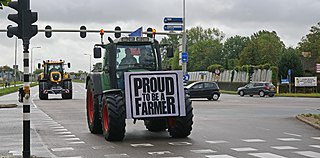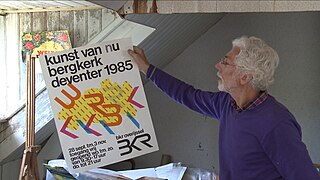
Schagen is a city and municipality in the northwestern Netherlands. It is located between Alkmaar and Den Helder, in the region of West Friesland and the province of North Holland. It received city rights in 1415. In 2013, Schagen merged with the neighbouring municipalities of Zijpe and Harenkarspel, forming a new municipality, also called Schagen. The town hall is located in the main town of Schagen.

The Eighty Years' War or Dutch Revolt was an armed conflict in the Habsburg Netherlands between disparate groups of rebels and the Spanish government. The causes of the war included the Reformation, centralisation, excessive taxation, and the rights and privileges of the Dutch nobility and cities.

Wilhelmus Maria "Wim" Jonk is a Dutch professional football manager and former player, who is the current technical manager of Eredivisie club Volendam.

Hollandscheveld is a village in the municipality of Hoogeveen, the Netherlands. It was founded in the 17th century after the Hollandsche Compagnie bought the land to harvest its peat. It was initially named Hollandsche Veld which was later combined into just Hollandscheveld.

The Amsterdam Marathon, currently branded as TCS Amsterdam Marathon, is an annual marathon (42.195 km) in Amsterdam in the Netherlands since 1975. The road race has a Platinum Label from World Athletics. During the event, there are also a half marathon race (21.097 km) and an 8 km race in the program.

Wim Hora Adema was a Dutch author of children's literature and a feminist, notable for being the co-founder of Opzij, founded in 1972 as a radical feminist monthly magazine. She was one of the best-known women of the Dutch second wave of feminism.

The Dutch Athlete of the Year is an annual award given to the most distinguished competitor in the sport of athletics from the Netherlands by the Royal Dutch Athletics Federation (KNAU). A shortlist is drawn up by a group of federation officials and sports journalists and then goes to a vote to the public. The award is presented at the annual end-of-year gala of the federation.

The Vondelstraat riots were violent disturbances on Vondelstraat in Amsterdam, the Netherlands between squatters and the state in March 1980. It also involved the deployment of military tanks on the streets for the first time since World War II, and was one of the most serious disturbances involving squatters in the country.

Squatting in the Netherlands is the occupation of unused or derelict buildings or land without the permission of the owner. The modern squatters movement began in the 1960s in the Netherlands. By the 1980s, it had become a powerful anarchist social movement which regularly came into conflict with the state, particularly in Amsterdam with the Vondelstraat and coronation riots.

The Dutch farmers' protests are a series of demonstrations by Dutch livestock farmers, characterised by the use of tractors to block roads, and occupy public spaces. The protests were initially triggered in October 2019 by a proposal in parliament to halve the country's livestock in an attempt to limit agricultural pollution in the Netherlands, but protesting farmers have frequently told media that they are motivated by a perceived lack of respect for their profession by the Dutch populace, media and politicians. The protests combined several action groups and an amalgamation of larger goals, which included less government regulation for farmers, more air time for pro-farmer sentiments, and more policy to punish Shell and Tata Steel for their part in the emission crisis.

The Farmer–Citizen Movement is an agrarian and right-wing populist political party in the Netherlands. It is headquartered in Deventer, Overijssel. The current party leader is founder Caroline van der Plas, who has led it since its creation in 2019.

The 2021 Dutch curfew riots were a series of riots in the Netherlands that initiated as protests against the government's COVID-19 prevention measures and specifically the 21:00–4:30 curfew that was introduced on 23 January 2021. The police have described the riots as the worst in the country since the 1980 coronation riots.

Henri Bontenbal is a Dutch politician and energy consultant who has served in the House of Representatives since 18 January 2022. He has been the leader of the Christian Democratic Appeal (CDA) since 14 August 2023.

Protests against COVID-19 in the Netherlands were a series of protests and riots in the Netherlands against the government COVID-19 prevention measures, which were in force between 27 January 2020 and 20 May 2022, with travel restrictions lifted on 17 September 2022. The protests came to a head with the 2021 Dutch curfew riots in response to a nationwide night-time curfew between 23 January and 28 April 2021. Since the end of the COVID-19 pandemic in the Netherlands, a number of anti-lockdown protest groups and individual protesters have shifted their attention to the ongoing, largely concurrent Dutch farmers' protests against government legislation to limit agricultural pollution by downsizing livestock production.

The 1989–1990 Dutch farmers' protests, for want of an unambiguous official name also referred to as the Farmers' Revolt, was a series of protests by Dutch farmers of arable land. Starting locally in February–March 1989 and culminating in nationwide demonstrations in February–March 1990, the protests were a response to changes in government agricultural policy beginning in the mid-1980s.

The 1963 Dutch farmers' revolt in Hollandscheveld, the Netherlands, was a rebellion led by Dutch farmer and politician Hendrik Koekoek against the Landbouwschap over the eviction of three farmer families. The rebellion was also referred to as the Revolt of the Braves.

Euphrasius Franciscus Hendricus "Fra" Paalman, was a Dutch graphic designer, visual artist and art teacher, who lived and worked in Hengelo (Overijssel), the Netherlands. Paalman designed, among other, book covers, brochures, posters, vignettes and corporate identities. As a graphic artist he made autonomous work too, especially etchings, screen prints and monotypes. His oeuvre also includes photographs, collages, sculptures, drawings and paintings, which he focused more on from the 1990s onwards. This work encompasses representations of everyday things, portraits of people, animals and landscapes, visions of the city and commentary on political events, as well as constructivist compositions and abstract images. The work often has a somewhat alienating element. As a teacher, Paalman has passed on his vision, knowledge and skills to countless people, young and old, through educational programs, courses and workshops.






















